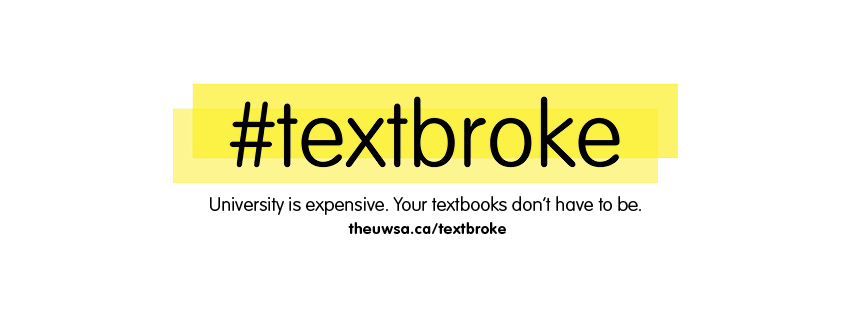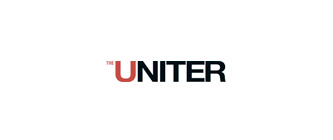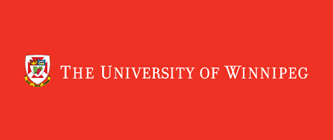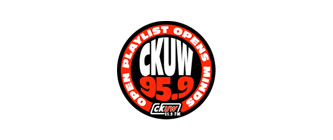Textbroke
#Textbroke is a campaign to advocate for free and open access to textbooks.
School is expensive but your textbooks don’t have to be.
Fill out this survey here!
Open Educational Resources
Open Educational Resources are free and accessible texts (like textbooks and course content) that are openly licensed. These texts can be shared, updated, localized and used several ways. They are peer reviewed, and written by experts in the subject areas, but unlike standard textbooks, they can be continually modified, remixed, and kept up to date.
Despite having many benefits, only three courses in the University of Winnipeg have adopted open textbooks. An increase in OER adoptions at UWinnipeg will make education more affordable and hence, more accessible.
Let’s Talk About Accessibility
Course materials need to be financially and physically accessible. Textbooks that are free or low-cost decrease the financial burden on students and hence, make education financially accessible. Course materials (usually in a digital format) that are easy for students with disabilities to access make education physically accessible.
OER Benefits Everyone
Adopting Open Educational Resources benefits everyone in education. OER are openly licensed which means faculty can customize them to suit their teaching style and students’ needs and interests.
Students can save money on textbooks and spend it on essentials like rent and food instead. Textbook costs add up once you take all the courses students take in a semester into consideration and most student pay for textbooks out of their own pocket – a fact that many professors aren’t aware of.
Both students and faculty benefit from having course materials available digitally – whenever they need, wherever they need. Most of all, students with disabilities, who rely on screen readers to learn.
Students, tell your professors how #TextBroke you are!
When you fill your course evaluations, let your professors know how much you spent on textbooks for that course, if your textbooks were useful, and what you’d rather spend your money on. Ask your profs to include access statements in their course calendar. You can also direct them to this website, which gives them more information on OERs.
Or, let us know how #TextBroke you are!
Fill up this online survey or fill up a in-person, available at Riddell Hall from 12.30-1.30 on March 26 and 28. Just scan the QR code in the handbill and posters for the survey to pop up! We’ll compile a report and send it to UWinnipeg faculty and administration.
Professors, make your course materials more accessible!
Making your course materials more accessible doesn’t have to be hard. Here are some things you can do to improve accessibility.
- The UWinnipeg Library is an incredible database of Open Access Resources and even, a librarian dedicated to encourage OER adoptions. Reach out to Brianne Selman at b.selman@uwinnipeg.ca or check out their website here.
- Include an accessibility statement in your syllabus that lets your students know that you recognize that barriers exist and support their needs. Check out this link for some examples of access statements.
- Make your PDFs and materials visually accessible! That means that PDFs should be compatible with screen readers and follow CNIB’s Accessible Print Guidelines. Check out some accessiblity cheat sheets here!
- Or, write your own course materials! Many universities offer a stipend or paid time off to instructors to write course materials. Advocate to the University for this or write a low-cost textbook to sell for profit!
Want to learn more?
For information on why OER adoptions are important and what you can do as a student, contact your VPEA at vpea@theuwsa.ca
For information on available OER alternatives, contact Scholarly Communications and Copyright Librarian, Brianne Selman at b.selman@uwinnipeg.ca
For information on improving physical accessibility of textbooks, contact UWSA Accessibility Director, Mohamed Behl at accessibility@theuwsa.ca
Some OER Facts:
- According to this Macleans article, students in Canada spend an average of $773 on textbooks in a year, with business students paying the most.
- According to data provided by the Canadian Federation of Students, an average University of Winnipeg student spends $859.33 a year on textbooks, the 15th highest nationally.
- At Kwantlen Polytech, you can do an entire certificate or associate degree called Zed Cred with no-cost textbooks.
- The University of Calgary has developed its own Adopt and Adapt model for OER development, where they gave out grants for OER development.
- Salt Lake Community College, Kwantlen Polytechnic University, University of Hawaii, Lansing Community College and others indicate OER Courses or textbooks cost in the course calendar – so students know how much they’re paying for textbooks when they register for a course.

























